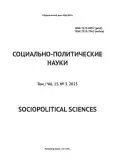Interpol Activities and Artificial Intelligence Issues
- 作者: Zagaynov M.R.1
-
隶属关系:
- Financial University under the Government of the Russian Federation
- 期: 卷 15, 编号 3 (2025)
- 页面: 93-99
- 栏目: International Relations, Global and Regional Studies
- URL: https://journals.eco-vector.com/2223-0092/article/view/687863
- DOI: https://doi.org/10.33693/2223-0092-2025-15-3-93-99
- EDN: https://elibrary.ru/SQNNBP
- ID: 687863
如何引用文章
详细
The author, analyzing the activities of international organizations and issues of artificial intelligence, cannot but refer to the activities of Interpol, an international criminal police organization created to promote cooperation between law enforcement agencies of different countries in the fight against crime. Since its main task is to exchange information between member countries, coordinate investigations of crimes of an international nature and ensure the interaction of national police services, it is very important to clarify the issue of using artificial intelligence (AI) in this work. The problem of cybercrime, which is already acquiring global proportions, also plays an important role. And here, it is quite relevant to consider how artificial intelligence fights artificial intelligence and what tools have been created for this. In this regard, the purpose of this article is to identify the role of artificial intelligence in the activities of Interpol. The author concludes that artificial intelligence plays an important role in modern law enforcement systems and for Interpol due to its ability to process large volumes of data, identify patterns and improve the effectiveness of crime investigations. The use of machine learning technologies allows you to optimize the processes of information analysis, identify suspicious activity and prevent security threats. The projects that Interpol is developing make it possible to use artificial intelligence to expand police capabilities by automating the processing of large volumes of data, improving the efficiency of monitoring and predicting potential threats. For example, the creation of the “Metaverse”, a virtual headquarters that will serve as an immersive training space for law enforcement specialists. And these are only the first steps in implementing this idea. It is also worth noting the importance of developing, jointly with the United Nations Interregional Crime and Justice Research Institute (UNICRI), the “Toolkit for Responsible AI Innovation in Law Enforcement”. Thus, the combination of Interpol’s efforts and the capabilities of artificial intelligence significantly increases the effectiveness of the fight against international crime, ensuring the safety of citizens and the stability of society. Technologies allow us to quickly respond to threats and minimize risks, making the world safer and more secure.
全文:
作者简介
Mikhail Zagaynov
Financial University under the Government of the Russian Federation
编辑信件的主要联系方式.
Email: ni22nn@mail.ru
ORCID iD: 0000-0002-8913-849X
SPIN 代码: 7299-4810
Cand. Sci. (Econ.); Senior Lecturer
俄罗斯联邦, Moscow参考
- Badalov J. Artificial intelligence as a factor of international security: a comparative analysis of Neorealist and neoliberal approaches. Uzbekistan – Strategy 2030 from the Point of View of Young Scientists: Economics, Politics and Law. 2023. No. 1. Pp. 150–165. (In Rus.)
- Grishanina T.A. Artificial intelligence in international relations: The role and directions of research. Bulletin of the Russian State University of Economics. The Political Science Series. History. International Relations. 2021. No. 4. Pp. 10–18. (In Rus.)
- Ostryakova A.F. Legal regulation of the activities of the International Criminal Police Organization (Interpol). Society, Law, Statehood: Retrospective and Perspective. 2023. No. 2. Рp. 44–49. (In Rus.)
- Puchkova E.V., Morozov R.M. Russian and foreign experience in using Artificial Intelligence in law enforcement agencies. Law and Management. 2025. No. 1. Рp. 337–341. (In Rus.)
- Sitkov A.S. International cooperation of the police within the framework of Interpol on countering cybercrime and ensuring cybersecurity. Bulletin of the Moscow University of the Ministry of Internal Affairs of Russia. 2022. No. 5. Pp. 238–242. (In Rus.)
- Sitnikov K.A. International police cooperation: Concept, principles, types, and forms. Administrative Law and Procedure. 2025. No. 2. Рp. 46–50. (In Rus.)
- Fedorenko S.P., Zaikina A.A. Current problems of Interpol and ways to solve them. Internauka. 2024. No. 47-5. Рp. 37–39. (In Rus.)
- Eriashvili N.D., Sarbaev G.M., Ivanova Yu.A. Theoretical and legal foundations of countering international crime. Social and Humanitarian Review. 2021. No. 1. Рp. 43–50. (In Rus.)
- Bhaso N., Marwala T. Artificial intelligence and international relations theories. Palgrave Macmillan Singapore, 2023. 165 р.
补充文件










